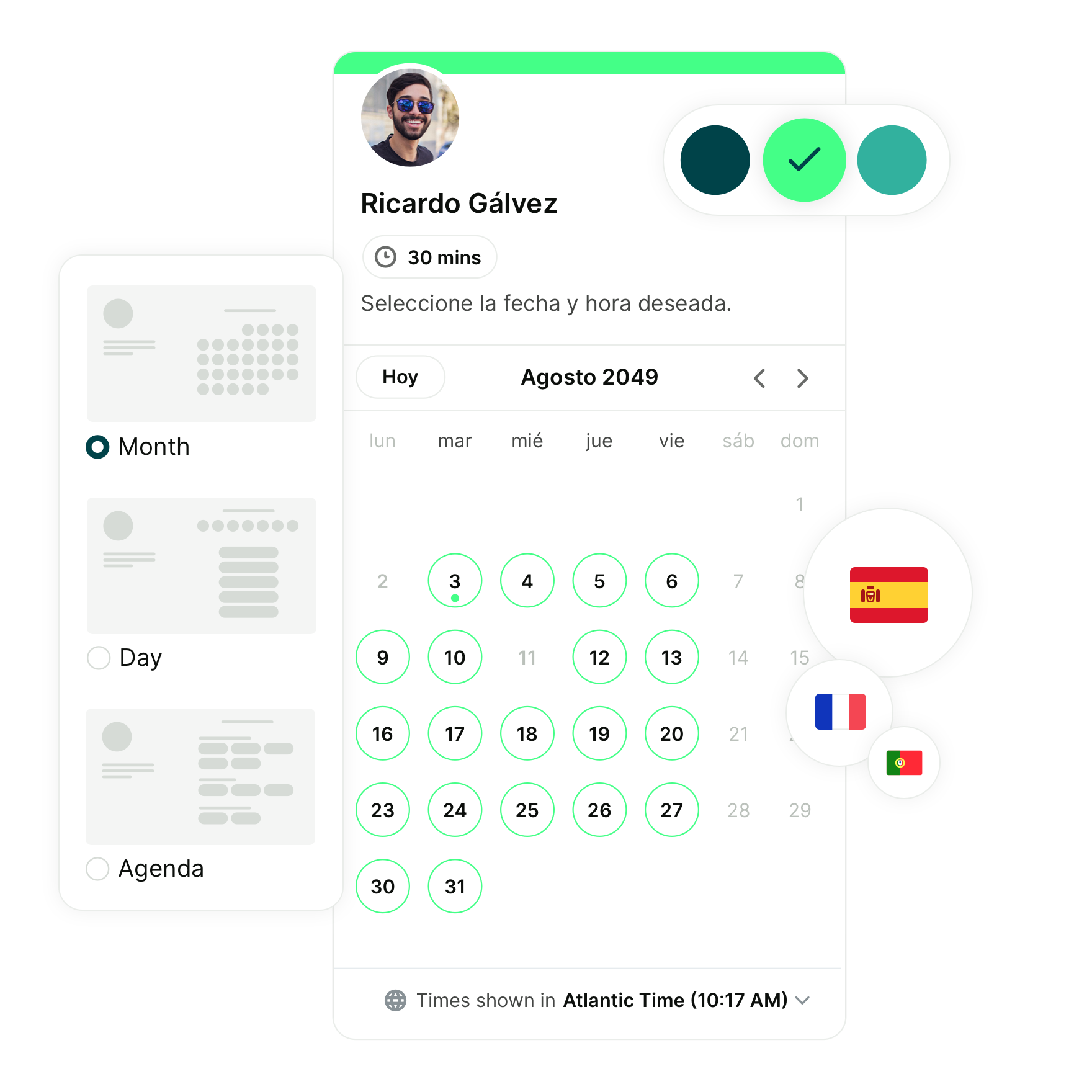How to Network: Tips for Beginners and Savvy Entrepreneurs
Learning how to network is one of the most valuable soft skills in the professional world. In this guide, we’re sharing simple networking strategies and real outreach examples to help you get started on the right foot.

Paulina Major

Ready to book more meetings?

We've all heard the saying, 'Your network is your net worth.' But let's be honest—how does talking to people you barely know actually help your business or career?
For many entrepreneurs, networking can feel awkward—especially if you’re not naturally outgoing. The idea of walking up to strangers and starting a conversation? Ugh.
The good news is that networking isn’t just for social butterflies. Anyone, including you, can learn how to network successfully and feel comfortable in the process.
In this article, we'll share some simple tips to help you build connections and use your network to grow your business and advance your career.
Let's kick things off by breaking down what makes networking so valuable.
Why is networking important?
Networking can have a positive impact on your career—and if you run a business, it can make all the difference.
Even if you’re still in university, that’s the perfect time to get into it. Why? Because networking can be your ticket to landing your first job!
The great thing is that networking is relatively low-risk.
Worst case? You learn something new.
Best case? It opens up countless opportunities.
Networking can help you:
- Land a job
- Get promoted
- Win new clients
- Raise your business’s profile
- Find a mentor to guide your growth
- Open doors to partnerships or referrals
- Learn from someone in your field who's a few steps ahead of you.
There’s a ton of research proving how effective networking can be. For example, Chief did a study and found that over 80% of women leaders at the manager level and above use networking to hit big career milestones like joining a board (90%), breaking into the C-suite (84%), and scoring higher-paying jobs (81%).
Another survey by LinkedIn found that 73% of people were hired because of a personal connection, with 70% knowing someone inside the company. It just goes to show—your network can be one of your greatest assets, giving you access to opportunities and support you wouldn’t have otherwise.
Networking isn’t just for extroverts
We all grew up hearing, "Don’t talk to strangers," but now we're adults, and it's kind of funny because we need to talk to strangers to grow our businesses or advance our careers.
So how do we actually talk to strangers, let alone network with them? The truth is, you don’t have to be the loudest person in the room to network with just about anyone.
The key is to focus on small but meaningful interactions. Maybe meet up with someone for coffee? Or send a LinkedIn message? Whatever feels comfortable to you, go for it! The worst that can happen is that they’ll say no.
|
A content writing business owner, Egle Rackauskaite, shared her two cents on how to network with people if you’re an introvert: “The best way to network as an introvert is to find what works for you. If big events and swapping business cards make your stomach churn, skip them. You can network by connecting with people on LinkedIn, Reddit, Quora, or Facebook, attending small local meetups, and focusing on building relationships rather than hitting numbers.” |
A beginner’s guide to networking
So, you know you need to network, but where do you start?
If you’ve never done much of it, we can all agree it can feel overwhelming.
That’s why we’ve put together this quick guide to help you get started.
Understand what you want to get out of it
Before you jump in, take a second to think about your goals. Are you trying to find new clients? Meet potential business partners? Get advice from someone experienced in your industry?
When you know what you want, it’s easier to figure out who to talk to and where to spend your time.
Find the right places to network
Not all networking happens in stuffy conference rooms. In fact, you can connect with people in all kinds of places. Some options to explore:
- LinkedIn: Perfect for building professional relationships online or landing work opportunities.
- Industry conferences and events: Great if you like face-to-face meetings and want to meet people in your field.
- Local networking events: These can be smaller and more relaxed, which might suit you if you prefer a less formal vibe.
- Reddit communities: Believe it or not, some of the best business advice happens in niche forums where people freely share ideas.
- Slack groups: There are tons of Slack groups out there, focused on specific industries or professions, where you can join and connect with others in your field.
- Online events and webinars: If you attend, don’t be afraid to send a follow-up email to the speakers or attendees afterward.
Reach out!
Once you’ve identified where to find the right people, it’s time to take action and reach out. Here’s how to navigate different networking settings:
In-person networking
If you’re at a conference or networking event, be ready to strike up a face-to-face conversation with a stranger. A great icebreaker is simply asking, “How did you hear about this event?” or “What brought you here today?” Then, let the conversation naturally flow from there.
When you're talking to someone in person, be mindful of your body language. Make eye contact, smile, and keep an open posture. People are naturally drawn to those who seem approachable and friendly.
|
💡Tip: Keep things light and don’t rush to pitch your business or services. Focus on making a genuine connection first. |
Also, show real interest in what the other person has to say. Ask open-ended questions like, 'What excites you most about your work?' or 'What challenges are you facing right now?' This helps you find common ground and makes networking a lot more enjoyable.
Want to simplify it even further? Aim to be interested, not interesting.
Before wrapping up, swap contact info, and make sure to follow up within 24 hours to keep the momentum alive.
LinkedIn outreach
I personally think LinkedIn is an excellent platform to connect with people in your industry. It’s great for networking and landing new work opportunities.
However, many people do it wrong. They send a generic “Let’s connect” message or simply send a connection request with no explanation.
You see, some people are very selective about who they accept as connections. That’s why you need to put a bit of effort into your outreach messages.
The first rule is to personalize your connection request. Start with a greeting, addressing the person by name, followed by mentioning something specific about their work, achievements, or even a recent post.

Once they connect with you, send a quick follow-up message. Keep it friendly but also give them a reason to engage further. For instance:
|
“Hi [Name], thanks for connecting! I really enjoyed reading your thoughts on [specific topic]. If you’re open to it, I’d love to hear more about your experience with [related subject]. Let me know if you’d be up for a quick chat!” |
Another effective networking strategy on LinkedIn is to ask for advice or insights. People tend to respond positively when you seek their opinion on something they’re passionate about.
Here’s what to say in your message:
|
“Hey [Name], I’m currently exploring [topic/industry], and I noticed your impressive experience in [their area of expertise]. I’d love to hear your thoughts on [specific challenge or topic]. Open to chat about it at some point this week?” |
You can also directly pitch your product, like in the example below:

Of course, you don't want to pressure anyone into buying from you—that’s a big no-no in networking!
But if you're developing a product or offering a service that needs testing or first-hand feedback, LinkedIn is a great platform to connect with people. You never know, they might even become your customers in the future.
Email outreach
Emails are still a great way to make connections. Especially when you want to reach out in a more formal or professional context.
Copy this simple networking email template and customize it as you see fit:
|
Subject Line : [Common Ground] + [Why You’re Reaching Out] Hi [Name],
|
Make sure to personalize your emails based on their work or mutual connections. Plus, in your meeting invitation email, don’t forget to include a scheduling link (more on these below) to make it easy for them to find a convenient time to chat.
Networking in async environments
Most networking happens online these days. And usually, it all results in a video call.
The tricky part? Trying to coordinate schedules with someone who’s probably super busy and might even be in a different time zone. That’s where scheduling links come in handy.
A tool like YouCanBookMe lets you send over a meeting scheduling link so the other person can pick a time that works for them based on your availability.
|
💡 Pro Tip: Plug your scheduling link into your outreach email, LinkedIn message, or even your email signature. |
With YouCanBookMe, you can set up different meeting types, like a 15-minute intro call for a quick chat, a 30-minute session for deeper discussions, or a one-hour call for longer conversations. The best part? The tool sends reminders too—because let’s be honest, it’s easy to forget these meetings sometimes.
How to prepare for networking conversations
Alright, so you’ve landed a networking meeting—maybe it’s a coffee date, a Zoom call, or you’re gearing up to meet someone at an event.
Now comes the part that can feel a little nerve-wracking: the actual conversation. But don’t sweat it! With a bit of prep, you’ll feel way more confident walking in (or logging on 😎).
🌟 Here are our top networking tips:
- Why are you doing this?: Before the chat, think about what you want to get out of it. Are you looking for advice? A business connection? Exploring a potential partnership? When you’re clear on your goal, it’s easier to guide the conversation and keep things on track.
- Prepare some questions: Write down a few questions or talking points ahead of time. Don’t worry, they don’t need to be super formal—just things you’re genuinely curious about. Be sure they’re relevant to why you reached out to that specific individual as well.
- Think about what you can offer: Remember, networking isn’t just about what you can get, but what you can give too. Maybe you’ve got a great resource to share, or know someone they should meet. A little value goes a long way.
- Take notes: During the conversation, jot down important points or anything that stands out. You’ll want to remember key details, right?
- Remember to say “thank you”: Everyone’s busy, so be appreciative when people make time to chat! A simple “thank you” at the end of the meeting is a must.
- Follow up after the call: Within a day, shoot them a follow-up email or message. Mention a takeaway you had from the conversation, send that resource you promised, or just say thanks again.
- Stay in touch: Don’t let this be a one-time thing. Keep the relationship going! Send them a quick message every now and then—maybe share an article they might find useful or just check in to say hello. The goal is to stay on their radar without it feeling forced.
Most importantly, keep it chill and enjoy the conversation. This isn’t a job interview. Just you talking to another human. You’ve got this! 💪
A networking checklist for academic advisors
Networking is a skill that takes practice. At first, it may feel uncomfortable, but the more you do it, the better you become.
College is a great place to start building those connections (and developing the skill of networking). So, if you're an academic or career advisor, it’s a good idea to share networking tips with your students during group advising sessions.
If your students say something like, 'Networking? I don’t really need that right now,' remind them how valuable networking can be in finding a job in the future.
Here’s a checklist that you can share with your students after career advising sessions (printable download below):
Networking Checklist For StudentsKnow what you want out of networking: Looking for an internship? Need a mentor? Trying to figure out your career path? Having a clear goal makes networking way more effective—and less awkward. Polish up your LinkedIn profile: Think of LinkedIn as your online business card. Make it shine! This is your space to connect with pros, alumni, and classmates who can help you along the way. Become a pro at researching contacts: Finding the right people is key. Whether it’s alumni from your school or people already working in your dream industry, doing some research before you reach out means you can optimize your outreach email (and hopefully get an answer!) Have a few conversation starters ready: Networking can feel uncomfortable, but it doesn’t have to be. Keep some go-to openers handy for events or emails, and you’ll feel more confident breaking the ice. Go to your school’s career events: Career fairs, networking events, and panels are great for meeting professionals and getting comfortable with networking in a low-pressure environment. Always follow up: After a good conversation, send a thank-you message or connect with the person on LinkedIn. |
Want to give this checklist to students as a handout? We've got you covered!

Wrapping up
And there it is—your playbook for effective networking to help you get started and grow your business. Networking isn’t rocket science, but it does require action!
Next steps?
- Start small—choose one person to reach out to this week.
- Polish up your LinkedIn profile.
- Set up a scheduling link to make booking meetings easy.
And remember, the connections you build today could unlock your next big opportunity tomorrow.
FAQ
How do I network for the first time?
The most low-key way to start networking is online. Use social media to build connections by commenting on posts, sharing relevant content, and introducing yourself digitally before transitioning to in-person or virtual events.
Where to find networking events?
Ultimately, it'll depend on the industry you're in or the types of people you're trying to connect with. However, a good place to start is to look for networking events on platforms like LinkedIn, Eventbrite, Meetup, or Slack communities. Also, check with local business organizations, industry conferences, or professional groups for both in-person and virtual opportunities.
Subscribe to our newsletter
Get productivity tips, news, articles and resources.
Written by
Paulina Major
Paulina grew up wanting to be a commercial pilot, but life steered her toward content writing. With a passion for tech and business, she’s found her calling in helping brands share their stories every day. Her non-negotiable? Morning coffee—because nothing starts without that first sip.



